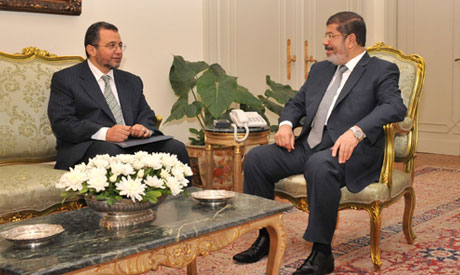
Egypt's President Mohamed Morsi (R) meets with Egypt's Prime Minster Hisham Qandil at the presidential palace in Cairo (Photo: Reuters)
A cabinet reshuffle was announced on Tuesday morning after days of expectations, although it is not expected to appease opposition demands.
The new reshuffle included nine ministers, at least three of which are prominent Muslim Brotherhood figures, namely the ministers of agriculture, investment and planning and international Cooperation.
Key ministers involved in Egypt's ongoing loan negotiations with the International Monetary Fund were replaced, including all economy ministers and the minister of petroleum.
Negotiations between Egypt and the IMF over a $4.8 billion loan have been stalling for several months, with the international lender requesting more rigorous expenditure cutting measures in the economic reform programme proposed by the government.
The IMF was reportedly doubtful of the government's ability to reform a costly fuel subsidy regime. New Minister of Petroleum Sherif Hadarra is reportedly very close to the Muslim Brotherhood.
Other economic files, including the Ministry of Planning and International Cooperation and the Ministry of Investment were given to influential Brotherhood members Amr Darrag and Yehia Hamed respectively. Hamed was one of the spokesmen for President’s Mohamed Morsi’s 2012 electoral campaign.
In the case of the Ministry of Parliamentary Affairs and the Ministry of Justice, replacements were appointed to vacant positions, following the resignation of the two ministers amid the ongoing struggle between the judiciary and the president, which has intensified in recent months.
Judge Ahmed Mekki resigned from his post as justice minister on 21 April, in protest at Brotherhood-organised protests demanding a “purge” of the judiciary, and amid controversy over proposed changes to legislation governing judicial roles.
This is the second cabinet reshuffle since Morsi appointed Hisham Qandil as prime minister in August of last year. In January, a cabinet reshuffle was much-criticised by opposition figures who accused the president and his prime minister of “Brotherhoodising” the government, after a number of prominent Brotherhood figures were given ministries.
Morsi’s decision to retain Qandil as prime minister has also been a target of repeated opposition criticism.
Opposition coalition group the National Salvation Front has been demanding the appointment of a neutral government to supervise the parliamentary elections, expected in October.
Egyptian cabinet spokesperson Alaa El-Hadidy announced on Tuesday the nine new ministers as follows:
Judge Mohamed Ahmed Soliman was appointed Minister of Justice to replace Ahmed Mekki who resigned on 21 April.
Judge Hatem Abdallah Bagato was named Minister of Parliamentary Affairs to replace Omar Salem.
Sherif Hassan Ramadan Hadarra was appointed Minister of Petroleum to replace Osama Kamal.
Ahmed Eissa was appointed Minister of Antiquities to replace Mohamed Saied.
Ahmed Mahmoud Ali El-Gizawi was appointed Minister of Agriculture to replace Salah Abdel-Moemen.
Fayad Abdel-Moneim Hassanein Ibrahim was appointed Minister of Finance to replace El-Morsi El-Sayed Hegazi.
Ahmed Mohamed Amr Darrag was appointed Minister of Planning and International Cooperation to replace Ashraf El-Arabi.
Alaa Abdel-Aziz El-Sayed Abdel-Fattah was appointed Minister of Culture to replace Mohamed Arab.
Yehia Hamed Abdel-Samie Hamed was appointed Minister of Investment to replace Osama Saleh.
Short link: